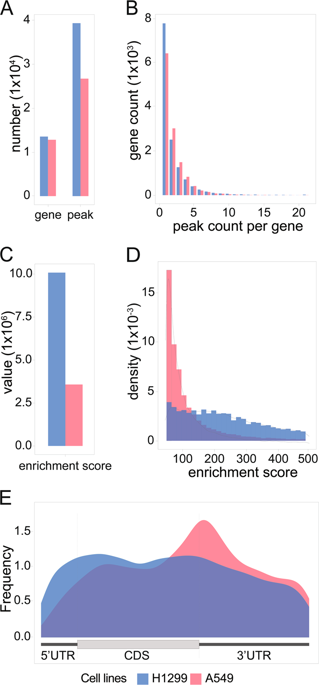The Pharmacogenomics Journal ( IF 2.9 ) Pub Date : 2019-10-17 , DOI: 10.1038/s41397-019-0110-4 Qianqian Meng 1 , Shuyuan Wang 1 , Shunheng Zhou 2 , Haizhou Liu 2 , Xueyan Ma 1 , Xu Zhou 1 , Hui Liu 1 , Chaohan Xu 1 , Wei Jiang 1, 2

|
Non-small cell lung cancer (NSCLC) is one of the leading causes of cancer deaths. Afatinib is the first-line anti-cancer agent for treatment of NSCLC. However, unexpected resistance has been a major obstacle for its clinical efficacy. In this study, we dissected afatinib resistance from the perspective of N6-Methyladenosine (m6A) modification. First, we depicted the m6A modification profiles for the afatinib resistant and sensitive NSCLC cell lines (H1299 and A549). We found that the sum enrichment scores of the resistant cell line (H1299) was much higher than that of the sensitive cell line (A549). Next, we identified the functionally m6A-modified genes, which were the intersection of the differentially m6A methylated genes and the differentially expressed genes between H1299 and A549, as well as negative correlation between m6A modification levels and gene expression levels. In addition, functional enrichment analysis of the functionally m6A-modified genes indicated that m6A methylation might modify cell cycle to affect afatinib response. Furthermore, the functionally m6A-modified genes were over-represented in the putative drug resistance-associated genes and the FDA-approved drug targets, and had significantly higher average degree and clustering coefficient than other genes in protein–protein interaction (PPI) network. We also identified five network modules, which were all related to drug resistance functions. Finally, survival analysis demonstrated that m6A modification could affect prognosis of NSCLC patients. In conclusion, we conducted a first attempt to dissect m6A methylation affection on afatinib resistance in NSCLC, and brought inspiration for the study of epigenetic roles in drug resistance.
中文翻译:

剖析 m6A 甲基化对非小细胞肺癌阿法替尼耐药的影响。
非小细胞肺癌 (NSCLC) 是癌症死亡的主要原因之一。阿法替尼是治疗非小细胞肺癌的一线抗癌药物。然而,意想不到的耐药性一直是其临床疗效的主要障碍。在本研究中,我们从 N 6 -甲基腺苷 (m 6 A) 修饰的角度剖析了阿法替尼耐药性。首先,我们描述了阿法替尼耐药和敏感的 NSCLC 细胞系(H1299 和 A549)的 m 6 A 修饰谱。我们发现抗性细胞系 (H1299) 的总富集分数远高于敏感细胞系 (A549)。接下来,我们鉴定了功能性 m 6 A 修饰基因,它们是差异性 m 6A 甲基化基因与 H1299 和 A549 之间的差异表达基因,以及 m 6 A 修饰水平与基因表达水平之间的负相关。此外,功能性 m 6 A 修饰基因的功能富集分析表明 m 6 A 甲基化可能会改变细胞周期以影响阿法替尼反应。此外,功能性 m 6A 修饰基因在推定的耐药相关基因和 FDA 批准的药物靶点中过度表达,并且在蛋白质 - 蛋白质相互作用(PPI)网络中具有显着高于其他基因的平均程度和聚类系数。我们还确定了五个与耐药功能相关的网络模块。最后,生存分析表明 m 6 A 修饰可能影响 NSCLC 患者的预后。总之,我们首次尝试剖析 m 6 A 甲基化对 NSCLC 中阿法替尼耐药性的影响,为研究表观遗传学在耐药性中的作用带来启发。











































 京公网安备 11010802027423号
京公网安备 11010802027423号